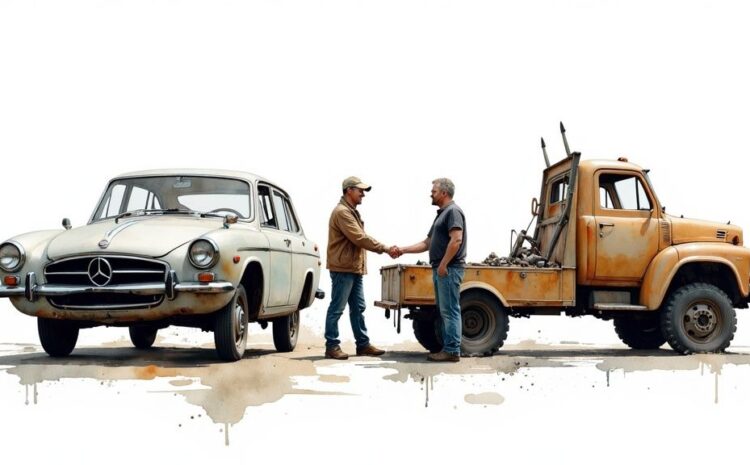
Finding Car Scrap Places Near Me a Simple Guide
If your browser history is filled with searches like "car scrap places near me," you're on the right track. Going local instead of using a big, faceless national broker isn't just about convenience—it often means a faster, more transparent, and better-paying experience.
Why a Local Scrap Yard is Your Best Bet
Dealing with a local scrap yard is a completely different ball game. You're not just another number in a national call centre queue; you're talking directly to the people who will actually be coming to collect and recycle your car.
This direct line of communication is huge. It cuts out the middleman, which nearly always translates to a better price for you and a far less complicated process.
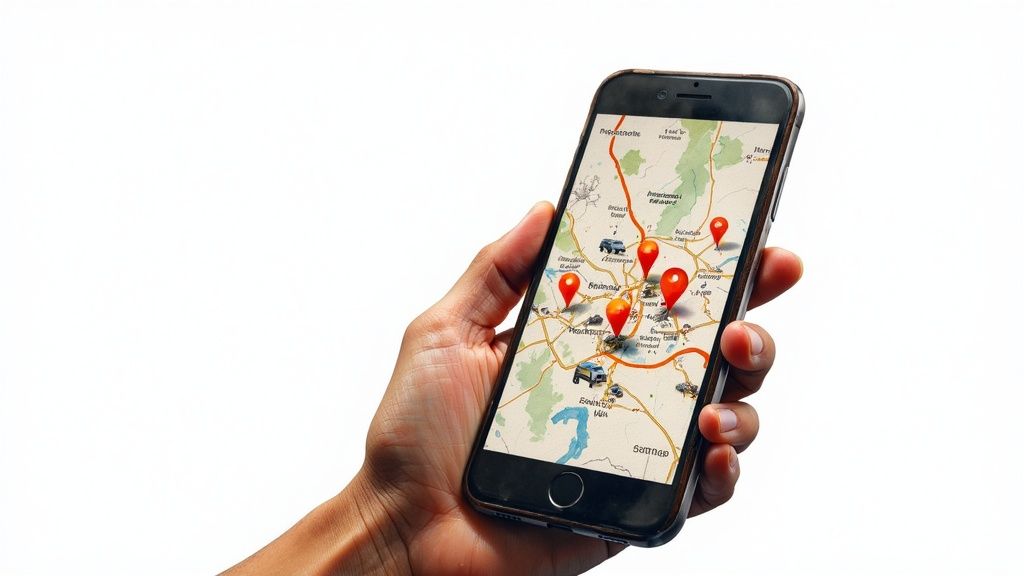
Local services live and die by their reputation in the community. They know the streets, the shortcuts, and the people. Our own operations across London and Surrey are a perfect example—that local knowledge has real-world benefits for our customers.
- Quicker Collection: A local crew can often swing by the same or next day. National networks? You could be waiting days for them to schedule a driver in your area.
- Real Accountability: Got a question? A last-minute problem? You're talking to the team right there, not a faceless agent hundreds of miles away.
- Boost Your Local Economy: It's simple. You're putting money back into your own community and supporting local jobs.
The Trust and Green Factor
Aside from the practical stuff, there’s a massive environmental angle here. Using a local service drastically cuts down on the carbon footprint from transporting your old car halfway across the country.
More importantly, it helps you ensure you’re dealing with a properly licensed Authorised Treatment Facility (ATF) that has to follow strict environmental laws.
Choosing a local, certified scrap yard is your best guarantee that your vehicle will be recycled responsibly and legally. It gives you peace of mind that you've done the right thing and that all the important paperwork is handled correctly.
The UK is actually a world leader in vehicle recycling, aiming to reuse or recover at least 95% of every car's materials. When you work with a nearby facility, you're plugging directly into that effort, helping to keep waste out of landfills. If you want to dig deeper, you can review more details about UK car recycling targets and see how your old car plays a part.
That local connection builds trust and makes sure your car's final journey is a responsible one.
Decoding Your Scrap Car Quote
So, you’ve got a few offers from local scrap yards. Before you jump at the highest number, it’s worth understanding what actually goes into that price. A scrap quote isn't just plucked from thin air; it’s a careful calculation based on what your old car is really worth in parts and raw materials.
Knowing what drives the value puts you in a much stronger position to negotiate and spot a genuinely good deal.
What’s Your Car Really Worth?
First and foremost, it all comes down to weight. Scrap metal is a commodity, bought and sold by the tonne. It’s simple, really: a hefty Land Rover has more metal than a little Ford Fiesta, so its baseline scrap value will always be higher.
But it’s not just about the raw metal. Certain parts of your car are surprisingly valuable. The catalytic converter is the star player here, as it contains precious metals like platinum and rhodium. Even if your car’s a non-runner, a working engine, a solid gearbox, or a set of alloy wheels can be salvaged and resold, adding a nice little bump to your final offer.
A common myth is that a car that won't start is basically worthless. The truth is, the scrap value is mostly in its weight and key components. The engine not turning over doesn't change how much steel is in the chassis.
To give you a clearer picture, here’s a breakdown of what the scrap dealer is looking at when they draw up your quote.
Key Factors Influencing Your Scrap Car Quote
| Factor | Why It Matters | Example Impact |
|---|---|---|
| Vehicle Weight | This is the foundation of the quote. More metal means more value. | A 2-tonne SUV will be worth significantly more than a 1-tonne city car. |
| Make & Model | Some models are known for having more valuable parts or being heavier. | A premium German saloon might have more valuable electronics than a budget hatchback. |
| Salvageable Parts | Components like the engine, gearbox, and axles can be resold if they're in decent nick. | A car with a blown head gasket but a good gearbox is worth more than one with both ruined. |
| Catalytic Converter | Contains precious metals (platinum, rhodium) with a high resale value. | A missing or aftermarket catalytic converter can reduce the quote by a surprising amount. |
| Global Metal Prices | The value of steel, aluminium, and copper changes daily on the world market. | A surge in global steel demand could mean your quote is higher this week than it was last month. |
As you can see, it's a mix of your car's physical attributes and what's happening in the wider world.
The Bigger Picture: Market Prices
The scrap metal market is a bit like the stock market—prices go up and down. The value of steel, aluminium, and copper is constantly shifting based on global supply and demand. This is why a quote you get today might be slightly different next week.
To give you an idea, UK scrap car prices have been on a bit of a rollercoaster. Throughout 2024 and into early 2025, the average price per tonne has swung between £120 and £220. After hitting a peak of over £200 in late 2024, the market cooled off, with prices settling closer to £125 per tonne by mid-2025. This was partly down to things happening overseas, like US import tariffs, which can affect demand for UK scrap metal.
Of course, the only way to know for sure is to get a valuation for your specific vehicle. Every car is unique. To get a personalised estimate based on your car's make, model, and condition, check out our guide on how much your scrappage car is worth. It'll give you the confidence to know you’re getting a fair price.
How to Find a Trustworthy Scrap Yard
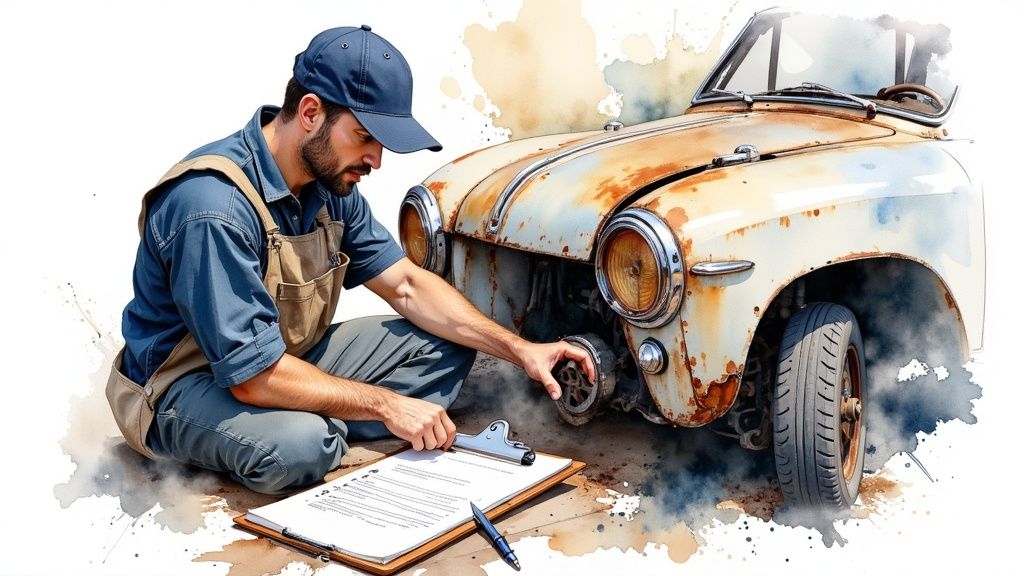
Finding a reliable place to scrap your car isn't just about chasing the highest price. It's about protecting yourself from future legal hassles and making sure your old motor is handled responsibly. The truth is, not everyone in the business plays by the rules, so a bit of know-how goes a long way.
First thing’s first: always check if the scrap yard is an Authorised Treatment Facility (ATF). This isn't just a fancy title; it's an official certification from the Environment Agency. It's your guarantee that the company has the proper setup to safely depollute and recycle your vehicle, meeting strict UK environmental standards.
Spotting the Red Flags
When you’re comparing local scrap yards, there are a couple of tell-tale signs that should set alarm bells ringing.
If a company offers to pay you in cash, walk away. It might sound tempting, but it’s been illegal since the Scrap Metal Dealers Act of 2013. Legitimate payments are always made by bank transfer or cheque. Simple as that.
Also, be cautious if a dealer seems cagey about providing a Certificate of Destruction (CoD). This official DVLA document is your only legal proof that the car is off your hands for good and you're no longer responsible for it.
A common but costly mistake is using an unlicensed dealer who never issues a CoD. Months later, the original owner can receive fines for an untaxed vehicle that, in the eyes of the DVLA, is still registered in their name and sitting on a public road.
With around 33.97 million registered cars on UK roads in late 2024, the number of vehicles reaching the end of their life is huge. This massive turnover keeps plenty of honest businesses afloat, but it also creates a market for rogue operators to exploit. Considering used car sales are still booming—with over 2 million changing hands in Q1 2025 alone—a steady stream of cars will always be heading for the scrap heap. You can explore detailed UK car market statistics if you're curious about the numbers.
At the end of the day, a reputable company like Fast Scrap Car will be completely upfront about their ATF status, how they handle payments, and what paperwork you can expect. No fuss, no secrets.
What To Do Once You've Found The Right Scrapyard
So, you've done your research and picked a reliable local scrapyard. What happens next? Getting your car ready for collection is simple, but getting it right means the whole thing goes off without a hitch and you get paid promptly. A few minutes of prep can save a lot of hassle.
First things first, clear out your car completely. We've all done it – left old receipts in the glove box, a stray pair of sunglasses under the seat, or forgotten bits and bobs in the boot. Have a thorough look through, because once that car is on the tow truck, getting anything back is next to impossible.
Next, you'll need your V5C logbook. This is the key document for proving ownership. The collection driver will ask you to fill out and sign section 4 (or section 9 on older V5Cs) to formally transfer the vehicle to them.
My Advice: Before you hand over the V5C, snap a quick picture of the signed section on your phone. It’s a handy bit of proof showing who you sold the car to and on what date. Always good to have for your own records.
On The Day Of Collection
When the driver arrives, they’ll run through a couple of quick checks. You'll need to show some photo ID, like a passport or driving licence, just to confirm you are who the V5C says you are. This is standard practice for any legitimate Authorised Treatment Facility (ATF), so don't be surprised.
The driver will also give the car a quick once-over to make sure it’s the one you described when you got your quote. After that, it’s just a case of signing the logbook, and they’ll sort out your payment. Just remember, it’s illegal to be paid in cash for scrap cars these days, so expect a bank transfer. The whole thing is usually done and dusted in under 15 minutes.
This graphic gives a great overview of the journey your car takes from the moment it leaves your drive.
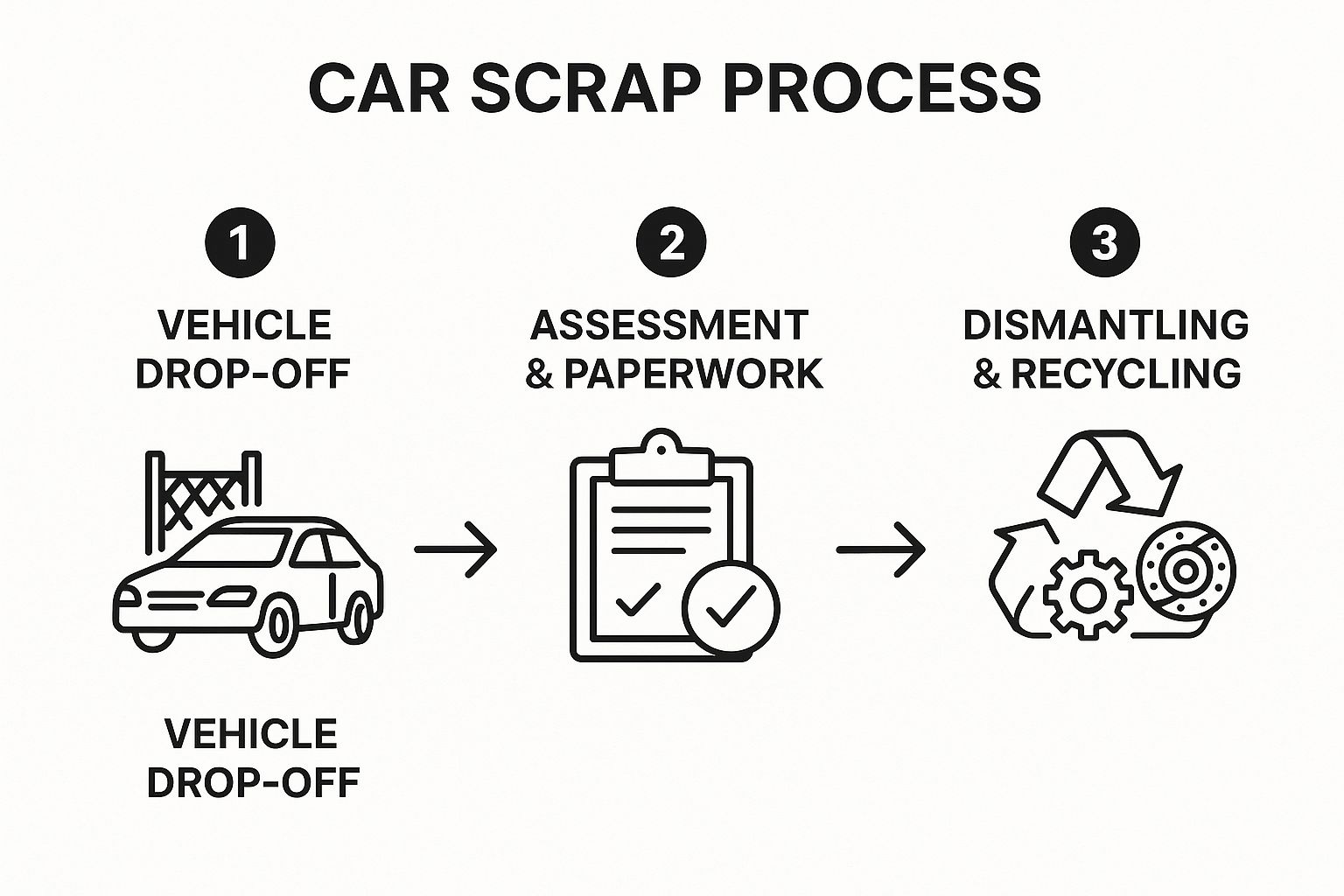
As you can see, it’s a professional process that turns your old vehicle back into raw materials. For a deeper dive into each part of the process, have a look at our full guide on how to scrap your car.
Don't Forget This Final, Crucial Step
This part is absolutely vital. Within seven days of your car being collected, the scrapyard must send you a Certificate of Destruction (CoD). This is an official DVLA document, and it’s your legal proof that the car is off the road for good.
Without it, you are still legally responsible for the vehicle. The CoD is what protects you from any future fines or liability. In the professional world of vehicle recycling, having the right equipment is just as important as the paperwork. For instance, workshops rely on tools like bi-metal reciprocating blades specifically designed for auto dismantling to do the job safely and efficiently.
Common Pitfalls to Avoid When Scrapping a Car
Finding a local scrap yard is one thing, but making sure you don't get taken for a ride is another. It’s easy to make a few simple mistakes that end up costing you both time and money. With a bit of insider knowledge, though, you can sidestep the common traps.
The most frequent misstep? Jumping on the first offer you get. I’ve seen it time and time again.
It's tempting to take the first quote and be done with it, but scrap prices can vary wildly from one place to the next. Always aim to get at least two or three different quotes. A few extra phone calls can make a real difference, ensuring you're getting a fair price based on your car's weight and any useful parts.
The All-Important Paperwork
Another classic error is dropping the ball on the paperwork. This is a big one.
You absolutely have to let the DVLA know you’ve scrapped your car. Until you do, you're still the legally registered keeper. If the scrap yard isn't a licensed facility and doesn't issue a Certificate of Destruction (CoD), you could be hit with a surprise fine months later. It happens more often than you'd think.
Finally, give your car one last, thorough sweep before it gets towed away. It’s amazing what people leave behind – personal items, CDs, even crucial documents tucked away in the glove box or boot.
Top Tip: Before the driver shows up, give yourself five minutes to go through every single compartment. Check under the seats, in the door pockets, everywhere. Once that car is on the lorry, getting anything back is a nightmare.
These checks are simple, but they’ll save you from fines and the frustration of losing something important. It's also worth knowing how scrapping differs from a salvage sale, which can be a bit more involved. For a deeper dive, check out our guide on how to sell a salvage car successfully.
Got Questions About Car Scrapping? We've Got Answers
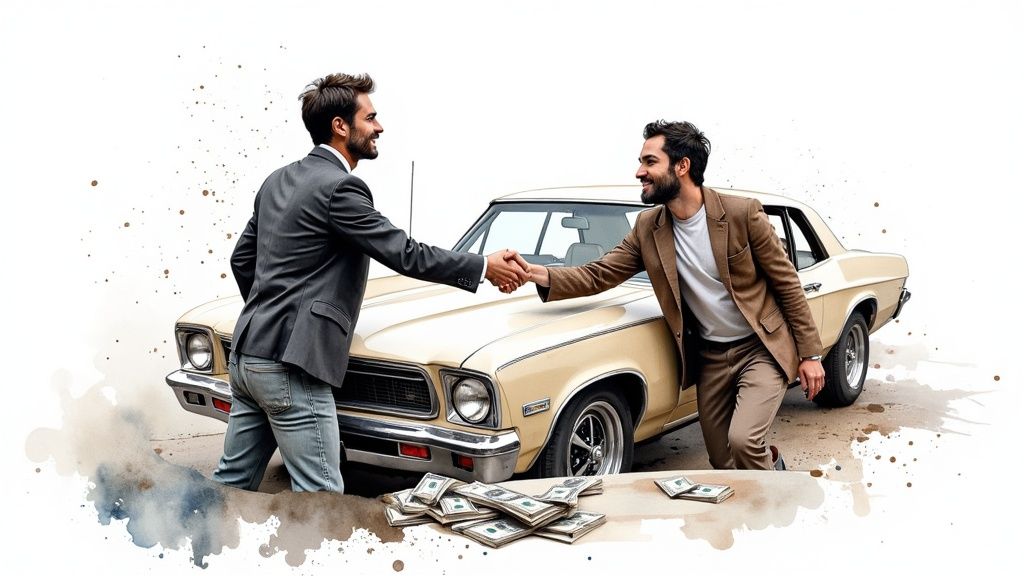
It’s completely normal to have a few questions before you wave goodbye to your old car. Scrapping a vehicle isn't something you do every day, so let's clear up some of the most common queries we hear from drivers.
Do I Really Need the V5C Logbook?
Ideally, yes. Having your V5C logbook makes the entire process incredibly smooth. However, if you've misplaced it, don't panic – it’s not always a deal-breaker.
Most legitimate scrap yards can proceed if you can prove you're the owner. You'll typically need to show a valid photo ID (like your driving licence) and a recent utility bill with your address. Just remember, the crucial part is that you still have to inform the DVLA in writing that the car has been sold to a scrap facility.
Why Can’t I Get Paid in Cash?
This is a big one, and it's all about staying on the right side of the law. Thanks to the Scrap Metal Dealers Act 2013, it is illegal for any UK scrap metal dealer to pay you in cash.
This legislation was introduced to clamp down on metal theft, so any reputable, licensed scrap yard will pay you by a secure bank transfer or a company cheque. If anyone offers you cash, it’s a major red flag.
Don’t forget about the Certificate of Destruction (CoD). This is the official DVLA document that proves your vehicle has been properly destroyed. Without it, you could be on the hook for future fines or taxes, as the car would technically still be registered to you.
What If My Car Has Serious Mechanical Issues?
Even if your car is a complete non-runner, it still has value. The price you're offered for scrap is almost entirely based on the car's weight in metal, not whether the engine starts.
So, whether it's suffering from a catastrophic engine failure or a severe case of the dreaded "death wobble" (if you've ever had a Jeep, you might find understanding the causes of a Jeep death wobble an interesting, if painful, read), it doesn't really matter. Its value lies in its raw materials.
Ready to get a fast, fair quote for your scrap car? The team at Fast Scrap Car offers free, same-day collection across London and Surrey, ensuring you get the best price with zero hassle. Get Your Instant Quote Today!
